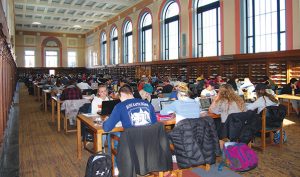1.1 World of Information
Many of us use Google every day. We trust its search algorithms will find exactly what we want and that Google will place the “best” results right at the top of our search results for our convenience. The efficiency of web search engines usually makes us feel successful and satisfied within a few seconds. But this impression that everything can be found easily on the open web is a fallacy, especially when it comes to scholarly publications.
You can’t trust that the best, most current, or most reliable information will always be delivered at the top of your results as soon as you hit enter on your keyboard. Getting a good grade in college often relies on finding and using the best and most authoritative information on a topic. To do this, you have to think critically, work through the resources you find, and construct your own ideas. In this course we focus on developing research skills that include:
- finding information appropriate to your needs,
- evaluating that information,
- and using it ethically.
This is known as information literacy and takes time, effort, and reflection to acquire.
A Few Fundamentals

When you hear the word “library,” what do you think of? Chances are you thought of a building – a place with lots of bookshelves, some computers for looking up materials; tables, chairs, desks; maybe a librarian or two. Traditional libraries like that have existed for centuries, serving as repositories for the world’s recorded knowledge. But the internet has changed how we need to think of research, libraries, and information literacy.
Today’s research libraries focus not only on the physical collections and spaces people use, but also on digital collections, other resources, and services that libraries have cultivated for their users.
The ISU Library provides a wide range of resources and services. We don’t have space to cover them all here, but here’s a small sample:
- Laptop & Equipment Checkout: The ISU Library has technology such as chargers, tablets, laptops, and more available for check out.
- Research Guides: Created by librarians with your work in mind, these guides include resources that will help you get started with research in a particular subject, class, or project.
- Course Reserves: Instructors work with Library staff to create lists of books, articles, and media for classes, the majority of which are available in full-text or streaming online. If your instructor has selected reserve materials, they will be listed in the course page in Canvas.
Collections and Connections
The amount of information available to us is also expanding rapidly. It is no longer possible for any research library to own everything in a specific subject area. In part this is due to the sheer number of scholarly books, journals, and articles published every year. Another reason that no library owns everything is skyrocketing costs. As a student, you’re keenly aware of the high cost of textbooks. For research libraries, books, scholarly journals, and other research materials have an extremely high price tag. Libraries have responded to these trends through cost-reducing efforts that emphasize information access rather than ownership:
Interlibrary loan: a service which allows students to borrow materials owned by other libraries for free. If our library doesn’t own the item you want, interlibrary loan can typically get something to you within a day or two. You’ll learn more about interlibrary loan in later chapters.
Open access: materials that don’t require a subscription or login to use. Librarians and scholars are working to develop more scholarly journals that are high-quality yet low-cost or totally free to access, allowing people to use them regardless of their ability to pay.
